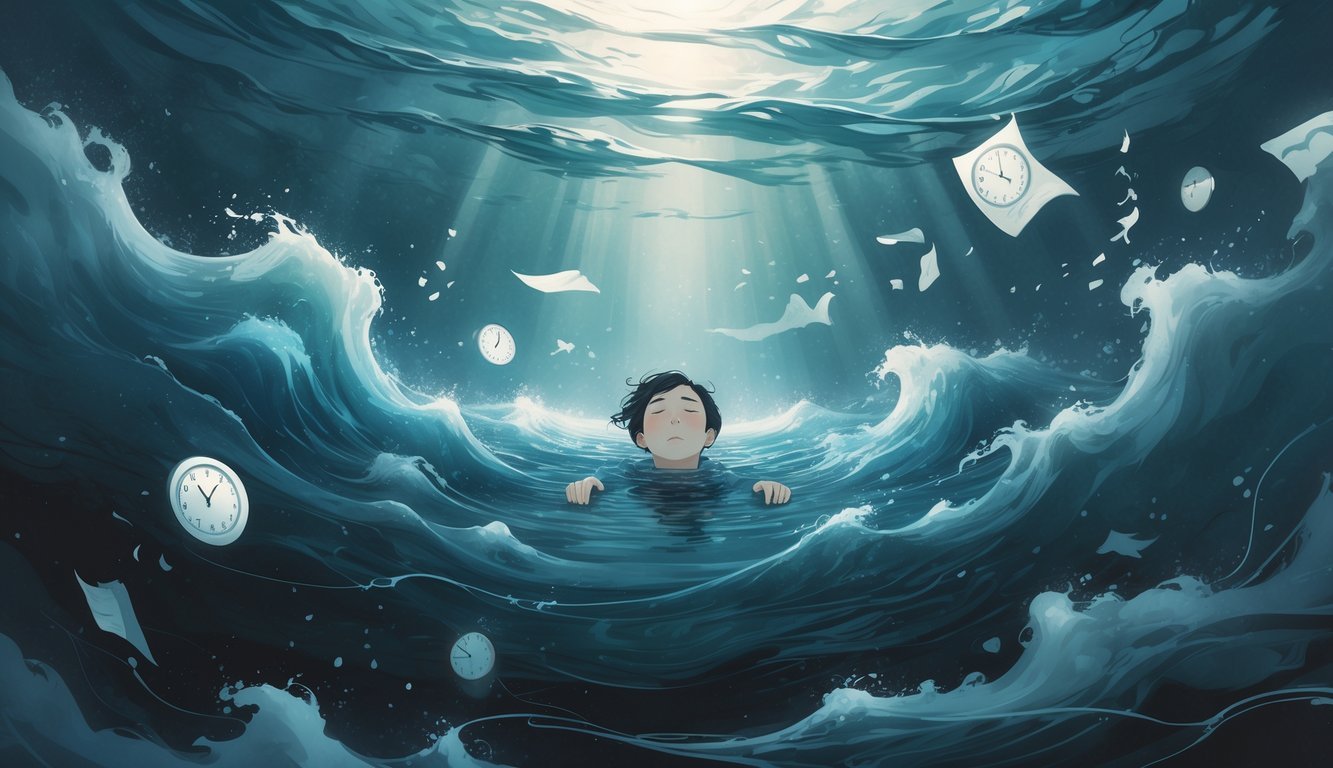Physical Address
304 North Cardinal St.
Dorchester Center, MA 02124
Physical Address
304 North Cardinal St.
Dorchester Center, MA 02124
Dreams of drowning indicate feelings of emotional overwhelm, unresolved issues, and personal transformation, urging individuals to confront hidden fears and seek emotional support.

Dreams about drowning usually point to emotions that feel way too intense or out of control. They often show that you feel overwhelmed by your feelings or by situations you just can’t seem to handle.
These dreams sometimes reveal worries or stress you might not even notice when you’re awake.
If you look a bit deeper, drowning dreams can show your mind working through tough emotions or past events.
Sometimes, you might be letting go of old habits or facing truths about yourself that aren’t easy to admit.
Understanding these dreams can help you notice what your subconscious is trying to say.
Maybe you’ll find some balance or a bit of calm in the process.
By tuning in to the meaning behind drowning dreams, you can get a better sense of your emotional world.
You might even spot how you handle stress and find healthier ways to cope.

When you dream about drowning, your mind often brings up strong feelings and struggles bubbling beneath the surface.
These dreams highlight fear, emotional heaviness, and real-life challenges you might be dealing with.
They show your subconscious trying to make sense of everything.
Drowning in dreams usually stands for being swamped by emotions or situations that feel totally out of your control.
Water plays a huge role here, acting as a symbol for your feelings or the flow of your subconscious.
If you dream of drowning, you might be struggling to keep up with these emotions.
You could also feel trapped or powerless.
These dreams often show a fight to keep your head above water during tough times.
Maybe you’re losing control over personal struggles or facing fears that really push you.
Dreams of drowning usually point to heavy emotional turmoil.
You might be carrying anxiety, stress, or fear that weighs you down every day.
If you feel overwhelmed in the dream, it matches how overwhelmed you might feel in real life.
Your subconscious uses drowning to show these feelings when words just don’t cut it.
Drowning dreams often bring up unresolved emotions you’ve pushed aside or ignored.
These bottled-up feelings can build up inside your mind.
When you dream about drowning, your subconscious might be urging you to face these hidden issues.
Maybe you’ve got stress or problems you haven’t fully dealt with.
Ignoring these emotions can make things worse.
Recognizing and working through them can help calm these intense dreams.

Drowning dreams often show big moments in your emotional or spiritual life.
They highlight where you feel overwhelmed, where you need a hand, and where you might find new strength.
These dreams invite you to heal, let go, and maybe even grow from your struggles.
Dreams about drowning usually reflect how much pressure you feel day to day.
You could be stressed from work, relationships, or personal stuff that’s piling up.
These dreams ask you to notice when emotions get too heavy to handle.
To cope, try mindfulness or relaxation techniques like deep breathing or meditation.
They can help you pause and clear your mind.
Self-care matters, too—take breaks, reflect, and set boundaries that feel right for you.
Your dream might be nudging you to build emotional resilience and find your balance.
If you dream about being saved from drowning or saving someone else, there’s a different message there.
It usually shows how important it is to ask for or give help when things get overwhelming.
Maybe you need to reach out to friends, family, or even a therapist.
Or perhaps your mind wants you to support someone else.
These dreams remind you that connecting and letting go are part of personal growth.
Don’t be afraid to accept help or show kindness to yourself and others when things get rough.
Drowning dreams can also stand for spiritual cleansing or starting over.
Water in dreams often represents emotions and the subconscious.
Struggling through water or drowning might mean you’re washing away old habits or negative thoughts.
This process makes room for renewal and transformation.
You get a chance to start fresh with a clearer mind and healthier emotional patterns.
Practicing meditation or quiet reflection can deepen this sense of spiritual rebirth.
Let the dream guide you toward nurturing your soul and growing as a person.

Dreams about drowning often show how you deal with strong feelings.
They can also point to important changes or how you see yourself around others.
This kind of dream might mean you feel overwhelmed but you’re finding ways to cope.
Surviving shows your inner strength and your ability to face challenges.
Yes, it usually means you’re dealing with strong emotions like stress or anxiety.
Water in dreams often stands for these feelings and how they affect you.
Drowning can point to spiritual growth or change.
You might be going through a transformation in your beliefs or how you see life.
Seeing someone else drown may reflect your worries about their struggles.
It can also mean you feel powerless or anxious about things you can’t control.
Repeating this kind of dream might mean you have unresolved feelings.
Your mind could be trying to help you work through ongoing stress or emotions.
When you figure out what your dream means, you start to notice your emotions more clearly.
That awareness might help you handle problems with a bit more calm and maybe even find ways to feel like you’re steering things instead of just drifting along.